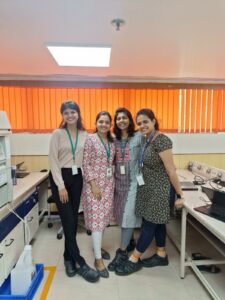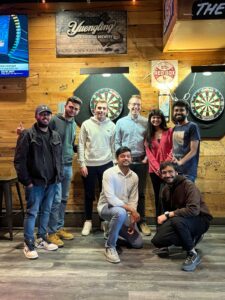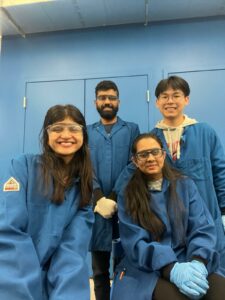Building Versatile Skills in Pharmaceutical Engineering

Tanvi Mahesh Khanvilkar, MS’25, pharmaceutical engineering, came to Northeastern for her master’s degree as an international student with no prior experience in engineering. She wanted to expand on her existing skills and knowledge in the pharmaceutical industry to give back to society. Through her commitment to learning and strong work ethic, Khanvilkar has built the foundation for a long, successful career.
Tanvi Mahesh Khanvilkar is expected to graduate from the pharmaceutical engineering master’s program in December of 2025. As she prepares to finish her degree, Khanvilkar reflects on her journey throughout the program and the incredible educational and professional opportunities she has experienced. Before Khanvilkar spoke about her academic journey she wanted to dedicate her degree to her late mother; it was her mom’s dream for her to pursue this, and she owes her this degree.

Khanvilkar and her co-workers at Johnson & Johnson.
Before coming to Northeastern for her master’s degree, Khanvilkar was working as a research and development associate at Johnson & Johnson in India. She said she was mostly working with over-the-counter drugs, and the position made her “understand more about the consistency, compliance, and safety that is required in the pharma industry”. Khanvilkar saw the importance of quality and engineering in her role and wanted to pursue a master’s degree in pharmaceutical engineering.
“I always wanted to use my skills to give it back to society in a meaningful way”.
Khanvilkar said she chose Northeastern for her master’s program because the curriculum is a mix of advanced technical knowledge with hands-on training. With the university being in a city that is a hub for the pharmaceutical industry, and additionally its famous co-op program, it was an easy decision for Khanvilkar to continue her education at Northeastern.
Success During Co-op
Khanvilkar wanted to broaden her knowledge and experiences during co-op to get a well-rounded view of the pharmaceutical industry. She believed it would be useful to her future career to build a versatile skill set and didn’t want to limit herself to a specific part of the industry. Which is why Khanvilkar accepted a co-op at Sanofi as part of its scientific data transformation team. During her time at Sanofi, she focused on projects that dealt with data standardization, equipment connectivity, and lab automation.
Khanvilkar said one of the most valuable aspects of this experience was getting hands-on exposure to various digital platforms such as Benchling, PowerBI and GraphPad Prism. Getting experience using these tools has helped her “understand better how data is captured, interpreted, and visualized in real-time research workflows” which will be helpful in her future professional work.
Khanvilkar admitted an elective course she took on statistics helped prepare her for the work she would be doing on her co-op at Sanofi. The course helped her recognize how statistics are used in the pharmaceutical industry and the importance of statistical tools in data interpretation.
Since Khanvilkar already had experience working in a lab at Johnson & Johnson in India, the co-op at Sanofi gave her exposure to the other side of the pharmaceutical industry. She was able to work at a desk and review all the work going on in the labs. Khanvilkar values the versatility she gained at Sanofi, where she enjoyed bench work but also developed skills that allowed her to contribute across both experimental and lab operations. She is grateful to have the opportunity to explore different career paths in the industry she is passionate about.
Research Opportunities

Khanvilkar at an outing with Professor Woolston and her peers.
Khanvilkar also had the opportunity to work with assistant professor of chemical engineering Ben Woolston in the Woolston Lab at Northeastern. She got involved in Professor Woolston’s research while taking one of his courses. Khanvilkar said Professor Woolston was one of the best mentors she has had, as he played a key role in helping her grasp the fundamentals of engineering when she was new to the field. In the Woolston Lab, Khanvilkar was also mentored by PhD student Justin Hayes. Her responsibility at the lab was to help quantify metabolites using a HPLC machine. She built on her existing lab skills by working with the equipment in a new context, gaining deeper insight into its application in a research setting. She also assisted with troubleshooting the instruments that were used to conduct the research. It gave her a great deal of confidence in working with complex equipment and interpreting data within the context of broader biological systems.
Reflections and Future Perspectives

Khanvilkar and her peers at a lab course at Northeastern.
Although Khanvilkar holds a master’s degree in biotechnology from India, she realized that while it gave her a strong foundation in molecular biology and research, she was looking for a more industry-focused, application-driven perspective in drug development and manufacturing. This led her to pursue a second master’s in pharmaceutical engineering to bridge the gap between scientific research and its translation into scalable, real-world therapies.
Thanks to the co-op program at Northeastern, Khanvilkar has been able to try out different jobs within the pharmaceutical industry. For anyone thinking of pursuing a master’s degree in pharmaceutical engineering at Northeastern, Khanvilkar speaks highly of the program’s diverse curriculum that gives students a wide range of experiences and opportunities in all aspects of the pharmaceutical industry.